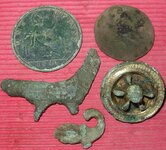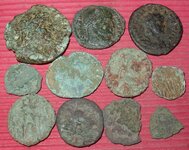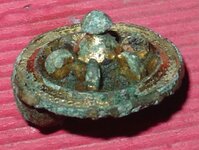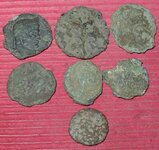CRUSADER
Gold Member
We did another 6 hours over 2 days & we have gridded over 90% of the scatter for the second time. We nearly had as many coins the 2nd time as we did on the first!
I found a nice Brooch today which if we don't come back, was a good finish.
11 Roman Coins (Fridays hunt)
7 Roman Coins (Todays)
2 Roman mystery partifacts
3rd C AD Gilt & Spoked Roman Brooch - A first of this type.
I found a nice Brooch today which if we don't come back, was a good finish.
11 Roman Coins (Fridays hunt)
7 Roman Coins (Todays)
2 Roman mystery partifacts
3rd C AD Gilt & Spoked Roman Brooch - A first of this type.
Amazon Forum Fav 👍
Attachments
Last edited:
Upvote
20









